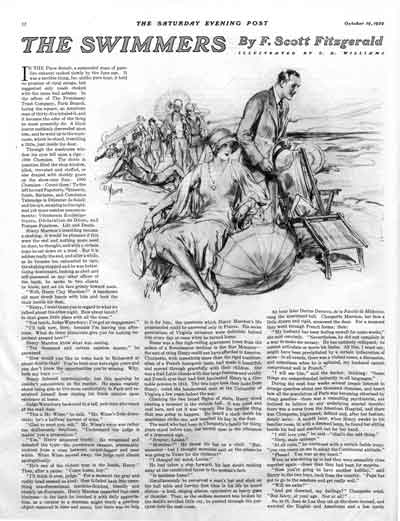from: The Short Stories of F. Scott Fitzgerald
edited by Matthew J. Bruccoli (Scribners, 1989)
Pages 217-236

Original illustration by Arthur William Brown for Metropolitan Magazine
I decided to stay in a seasonal realm and found myself reading (and enjoying) another Gatsby cluster story. "Winter Dreams" first appeared in Metropolitan Magazine in December 1922. and was later put in a collection.
F. Scott was working on his third novel at the time and eliminated some of the text in the magazine and later used it in The Great Gatsby. Little did I know while reading that "Winter Dreams" seems to be his most discussed short story--at least of the ones I have read thus far.
"In the fall when the days became crisp and gray, and the long Minnesota winter shut down like the white lid of a box..." We follow Dexter Green, winter dreamer and the finest golf caddy (only for extra pocket money) from age 14 to 32.
He has big dreams, as a golf champion commanding over imaginary audiences as he defeats Mr. T. A. Hedrick a hundred times--each different, but important. Typical 14-year-old boy stuff, I suppose.
Until he means Miss Judy Jones one day over the summer while he is caddying at Sherry Island Golf Club in New Jersey...bam! She ruins him, even though she is only eleven-- "beautifully ugly" but with a spark and "lips twisted down at the corners when she smiled..."
After observing and conversing with Miss Jones and her nurse, he quits. Suddenly because "he had received a strong emotional shock, and his perturbation required a violent and immediate outlet."
Part two takes place nine years later, and Dexter has gone to a university in the East (leaving behind the Midwest) and has become a successful business man (laundry business, washing woollen golf-stockings without shrinking them) and is invited to play at the Sherry Island Golf Club.
Guess who is there and is "arrestingly beautiful" and always looking as if she wants to be kissed?
Now we get more beautiful F. Scott prose:
"Later in the afternoon the sun went down with a riotous swirl of gold and varying blues and scarlets, and left the dry, rustling night of Western summer. Dexter watched from the veranda of the Golf Club, watched the even overlap of the waters in the little wind, silver molasses under the harvest-moon. Then the moon held a finger to her lips and the lake became a clear pool, pale and quiet..."
Dexter happens to come across Miss Judy Jones at the lake, and of course, he's already in love with her...just as every other man is..."His heart turned over like a the fly-wheel of the boat, and, for the second time, her casual whim gave a new direction to his life."
This is the point where I'm internally screaming at Dexter--NO! She's going to break your heart! Don't do it, don't do it....but he doesn't listen. Poor Dexter.
Parts 3 and 4 we watch the intoxicating Judy work her spell and ruin a man. That's how women are, after all. "When the scarlet corners of her lips curved down, it was less a smile than an invitation to a kiss." Man? Many men, as the snobbish daughter of a rich man--she can do whatever she pleases.
"She was not a girl who could be 'won' in the kinetic sense--she was proof against cleverness, she was proof against charm;..." I think F. Scott is talking about me here, but maybe not.
Dexter finally realizes that he could not have Judy Jones (finally!)--"Then he said to himself that he loved her, and after a while he fell asleep." This is how these things go. He becomes engaged to another woman even.
But damn her, if that Judy Jones doesn't come back into the picture. Poor Irene doesn't stand a chance! Judy comes back from vacation and actually confronts Dexter and proposes to HIM:
"I'd like to marry you if you'll have me, Dexter. I suppose you think I'm not worth having..."
A million phrases of anger, pride, passion, hatred, tenderness fought on his lips. Then a perfect wave of emotion washed over him, carrying off with it a sediment of wisdom, of convention, of doubt, of honor. This was his girl who was speaking, his own, his beautiful, his pride.
"Won't you come in?" He heard her draw in her breath sharply.
Waiting.
"All right," his voice was trembling, "I'll come in."
We could end it right here. But we go on and we fast forward seven years to see what has become of Dexter and Judy. Poor Irene and the rest of the Sherry Island Golf Club crew. I'll stop right here and let you find out for yourself.
-----
I do love a good moment of tension. A moment that is written so clearly and with so much...HONESTY that it drips from the pages and wells up in my heart. Moments. F. Scott is so good with his moments between lovers or almost-lovers or will-never-be lovers.
I always get the question, "What do you write?"
I say, "short fiction." I get a look of confusion. "But like what?"
And then I come up with, "Moments. I write moments between people."
More confused looks. F. Scott understands.
~~J
Note: I had a good time noticing repeated words whilst reading (not complaining, only noticing) especially ecstasy and spasmodically.








